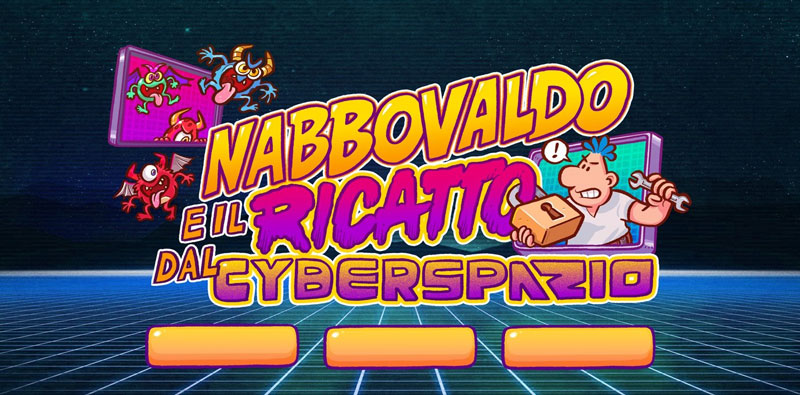by Giorgia Bassi, Stefania Fabbri and Anna Vaccarelli (IIT-CNR)
Ludoteca del Registro.it is a project implemented by the Registro.it (the Registry of .it Internet domains) of the Institute of Informatics and Telematics of the CNR (National Research Council) in Pisa, aimed to help students develop more responsible use of the Internet, with a focus on cybersecurity topics.
Ludoteca del Registro.it [L1] [L2], sponsored by the Garante per l’Infanzia e l’Adolescenza (the Italian Authority for Children and Adolescents) is a project to promote Internet culture. So far, the project has engaged about 500 classes and 14,000 students throughout the country, during educational workshops. It is aimed at schools from primary through to high schools, but teachers and parents can also find information and resources on the website. The purpose is to give a complete view of the Internet and understand what it is, why to use it and how to use it properly.
It is, therefore, crucial to make users, and especially the youngest ones, aware of the potential risks and encourage them to adopt behaviours that can avoid them. After all, human behaviour is still the weakest link in cybersecurity, as demonstrated by the rise of social engineering attacks such as phishing.
Providing the basis of Digital Culture and Cybersecurity skills, not only related to technical aspects but also extended to cultural ones, is crucial to create awareness and, therefore, to prevent cyber threats and risks.
The educational workshops are mostly focused on cybersecurity, but they also explain the technical infrastructure (TCP/IP protocol, IP address, packet switching, internet domain names, DNS system), in order to better master its use and take advantage of its opportunities.
Ludoteca has different means for different levels of school: the web app Internetopoli (the city of Internet), for primary school; the videogame "Nabbovaldo e il ricatto dal Cyberspazio" (Nabbovaldo and the blackmail from Cyberspace) and the related educational path for secondary schools; and Cybersecurity4Teens, comprising 10 hours of lessons and practice about Cybersecurity for high school. Finally, there is the training web portal "Presente Digitale" addressed to teachers, dealing with some digital topics, with the aim to help them master these arguments. All the initiatives are free.
The Internetopoli web app
One of the main tools of the project is Internetopoli, a multimedia application about the Internet, which is freeware and suitable for interactive whiteboards [L3] [1].
Internetopoli is the Internet city, a metaphor that links together all the macro themes of the project. The main topics, explained though the metaphor of the city, are listed below:
How the Internet works (Internetopoli is a city composed of streets, houses, and addresses, just as the Internet is made up of computers and devices, linked through special addresses called IPs;
- The domain names (addresses of the Internetopoli houses are the internet domain names, easy for the citizens to memorise);
- Governance and organisation of the Internet (Internetopoli, like all cities, is regulated and administered by local and international institutions);
- Safe and knowledgeable use (the citizens of Internetopoli must be responsible and respect rules in order to protect their privacy and that of others);
- Opportunities of the Internet (Internetopoli is a city rich in resources and services, useful for everyday life, work and study).
One of the most important concepts in the App is the “Internet citizenship”, to be interpreted as a community totally involved in a safer and responsible use of the Internet.

Figure 1: Internetopoli.
Cybersecurity4Teens
The "CyberSecurity for Teens" (CS4TY - [L4]) is a framework involving the 11–19 age group (secondary and high school students) with the purpose of putting together a series of resources and activities dedicated to cybersecurity issues. The goal is to acquire a vertical curriculum dedicated to cybersecurity, focusing on the following skills: protecting devices; protecting personal data and privacy; recognising and fighting the risks of "cyberspace", e.g., being aware of the interaction of people, software and services by means of technologies, devices and networks connected to it.
These skills will be achieved through the acquisition of knowledge of: systems threats, vulnerabilities and cyberattacks; and technical countermeasures such as authentication, cryptography and identification and intrusion prevention systems (antivirus and firewall).
The importance of the acquisition of such skills has led to the conception of CS4T in such a way that it will be extremely customisable according to the age groups involved, integrating different resources and methodologies.
The secondary school labs are based on the use of the videogame "Nabbovaldo and blackmail from cyberspace", a tool to introduce teenagers to cybersecurity topics in a funny and engaging way (see the following section).
High school labs are developed in three webinars (the first is about the main cyber threats, the second about the countermeasures, and the third about the main types of hackers) and a workshop held by some researchers of the Trust, Security and Privacy Unit of IIT-CNR [L5], with a total of ten hours.
The videogame: “Nabbovaldo e il ricatto dal Cyberspazio”
The videogame “Nabbovaldo and the blackmail from Cyberspace” [L6] has been designed for secondary schools [2]. The Nabbovaldo character was created for two comic books (“Nabbovaldo, ovvero le stagioni a Internetopoli” – “Nabbovaldo and the seasons in Internetopolis” and “Nabbovaldo contro i pc zombi” – “Nabbovaldo versus the zombie laptops”) written and illustrated by Gabriele Peddes. Nabbovaldo moves in Internetopolis, seeking his fortune; he is an inexperienced guy who must face the challenges and the opportunities offered by an unknown metropolis. In particular, he faces a ransomware that infected all the city. The videogame (a single player) deals with many cybersecurity topics: malware, hate speech, fake news, trolls, dark web, sexting, etc. The videogame is an opportunity for teachers to explore these topics with pupils and explain countermeasures.
Figure 2: The videogame "Nabbovaldo e il ricatto dal cyberspazio".
Teachers
The Ludoteca del Registro.it project includes the web portal “Presente Digitale” [L7], that hosts some online training courses, addressed to teachers. The courses are "Teaching by means of and in the net", "Computational thinking and Coding", and "Cybersecurity".
Links:
[L1] https://www.ludotecaregistro.it/
[L2] https://www.nic.it/en
[L3] https://www.internetopoli.it/
[L4] https://www.ludotecaregistro.it/per-le-scuole/cybersecurity-4-teens/
[L5] https://tsp.iit.cnr.it/en/
[L6] https://www.ludotecaregistro.it/il-videogioco-nabbovaldo/
[L7] https://presentedigitale.it/
References:
[1] R.M. Bottino, et al.: “Digital games in primary schools for the development of key transversal skills”, in Proc. of SUZA, 2019.
[2] L.S. Ferro, et al: “A game-based learning experience for improving cybersecurity awareness”, 4th Italian Conference on cybersecurity, Itasec 2020, Ancona, Italy, 4-7 Feb 2020, pp. 235-242.
Please contact:
Giorgia Bassi
IIT-CNR, Italy











